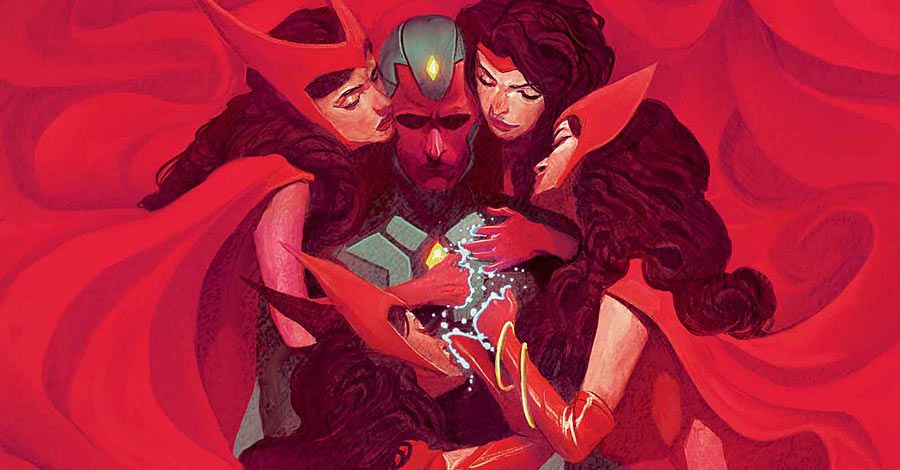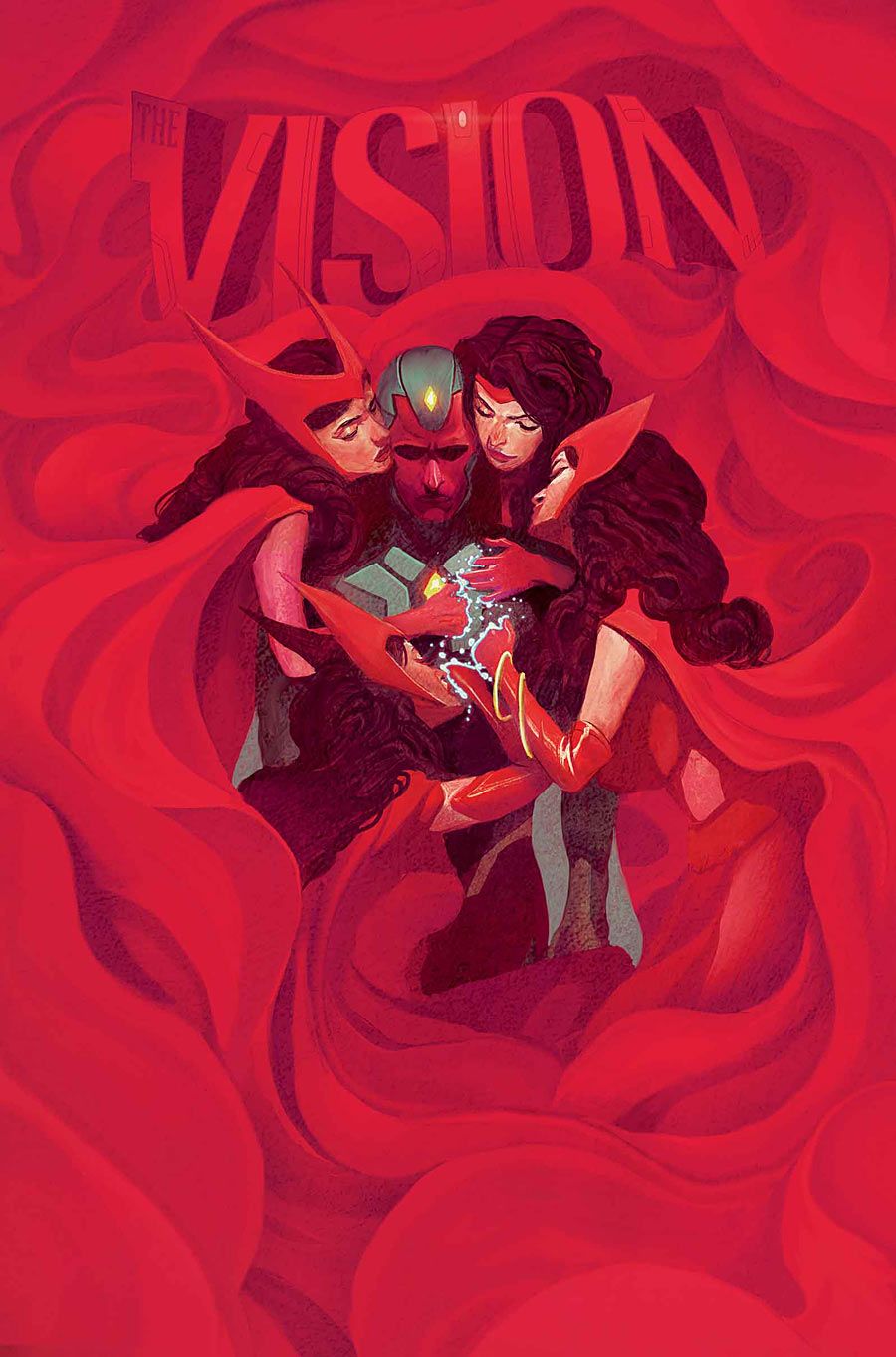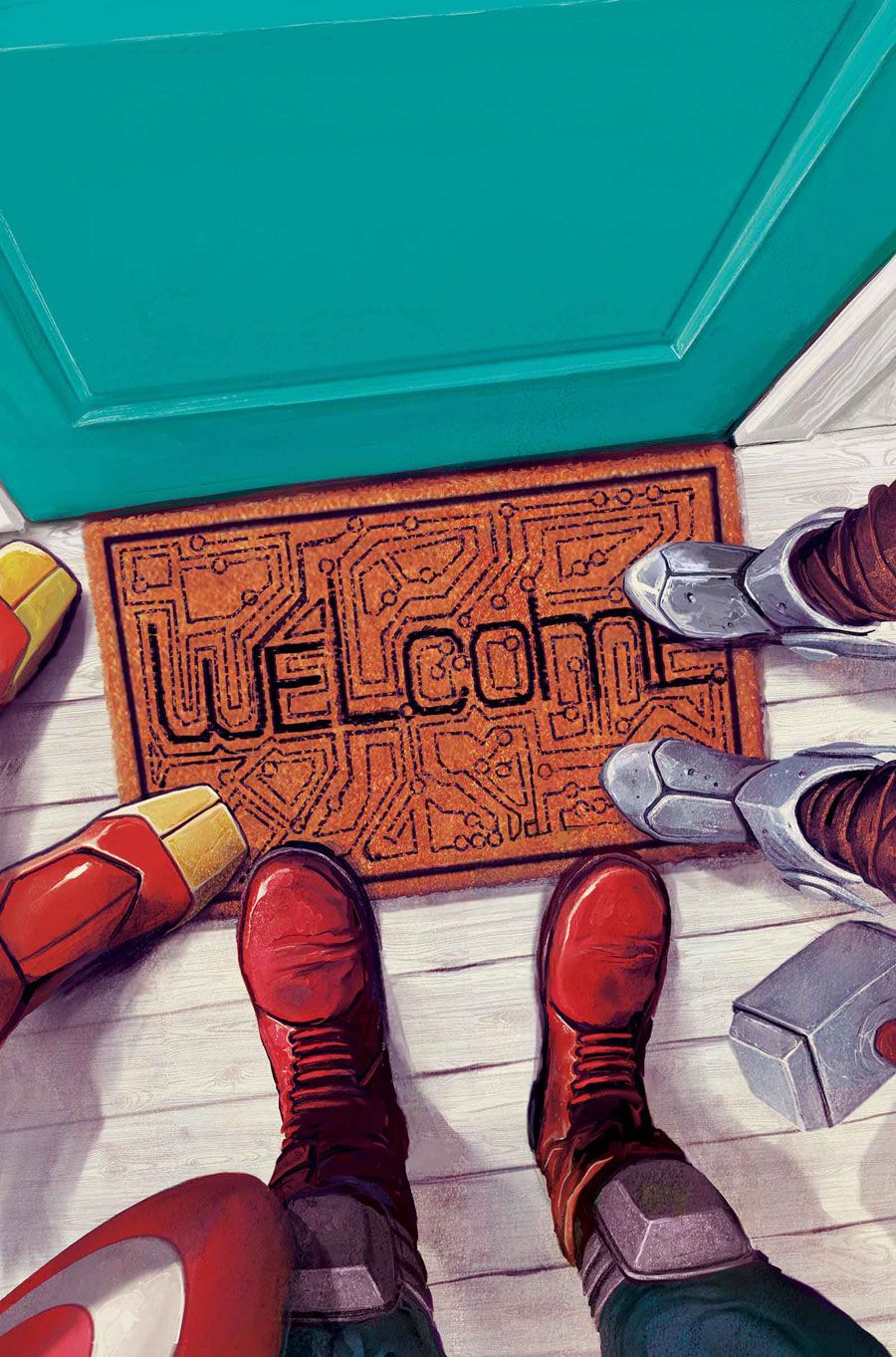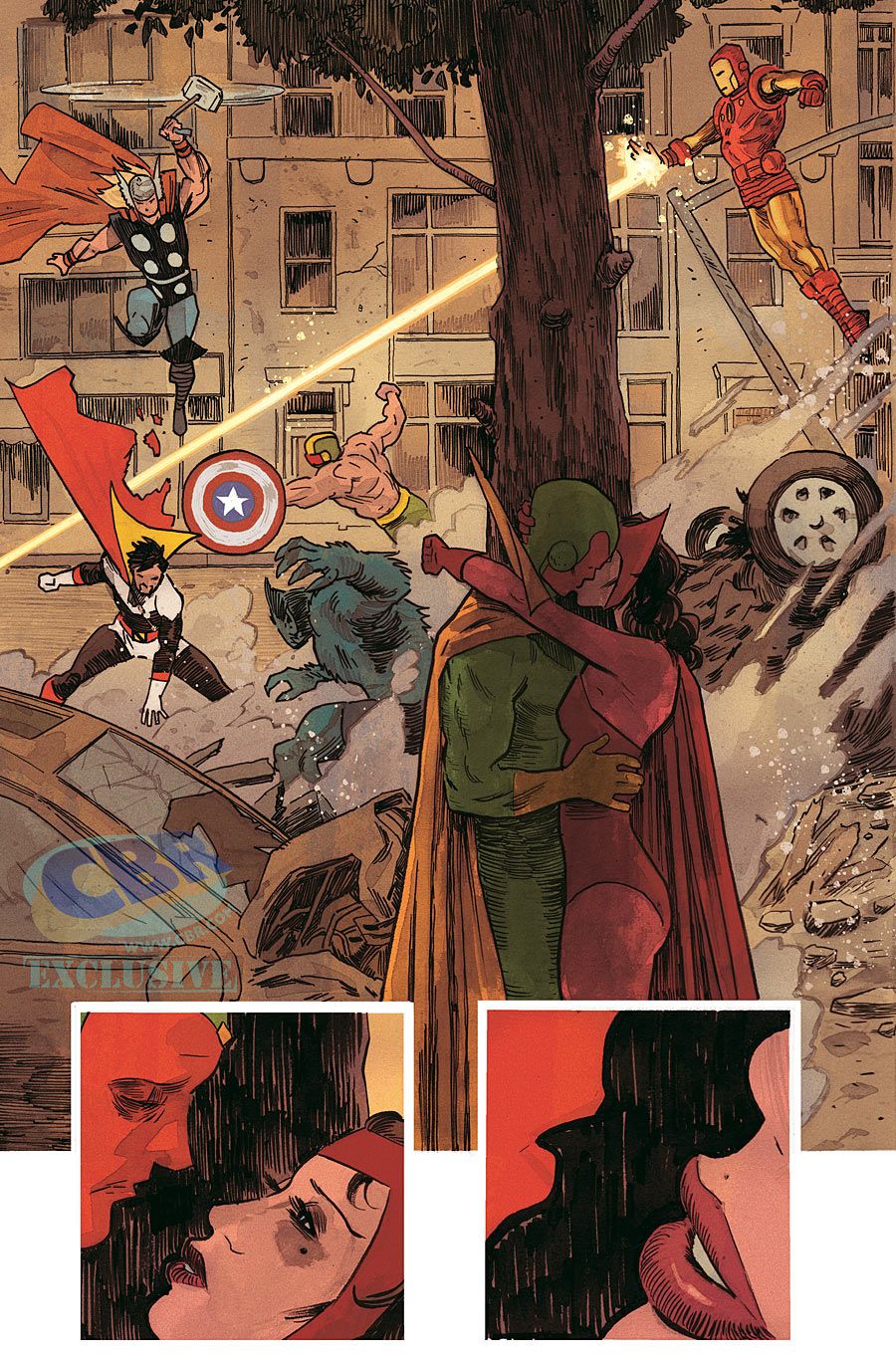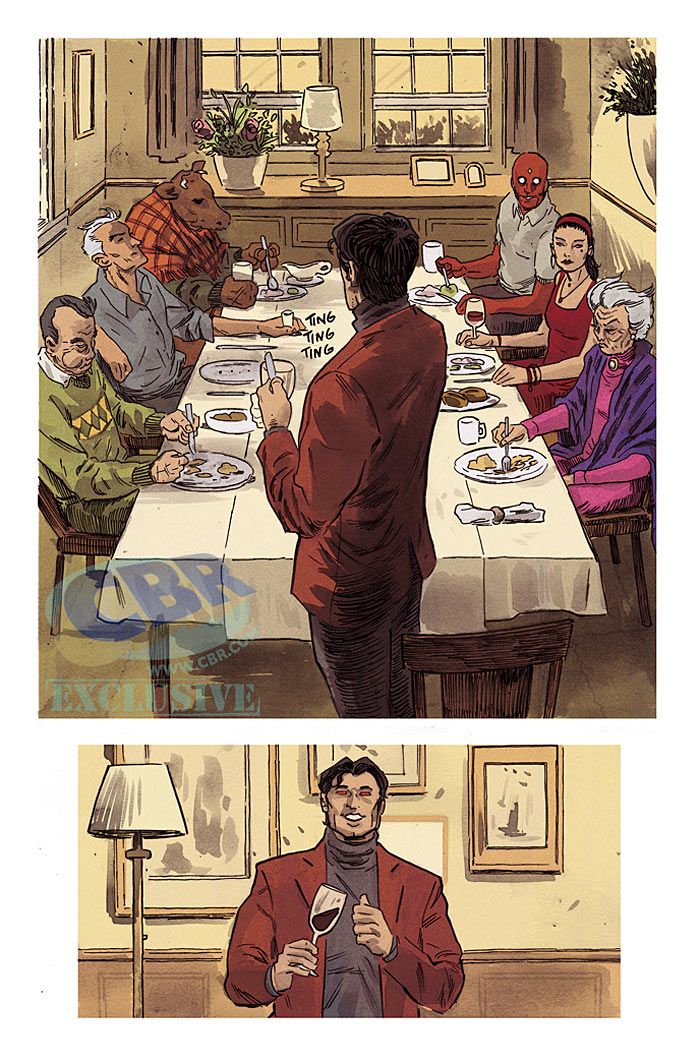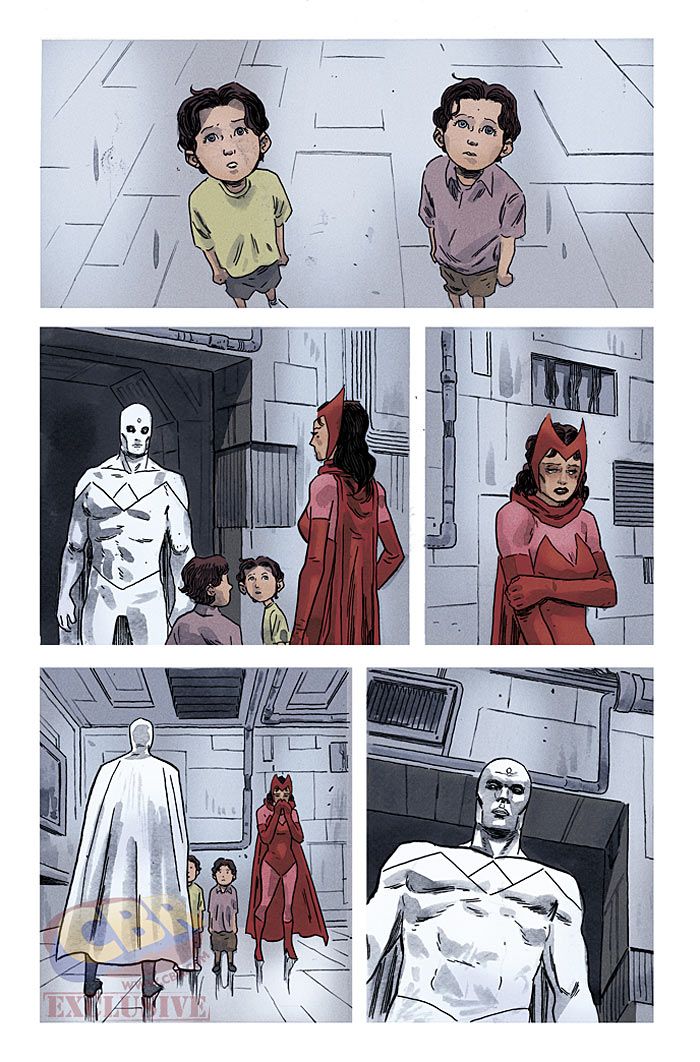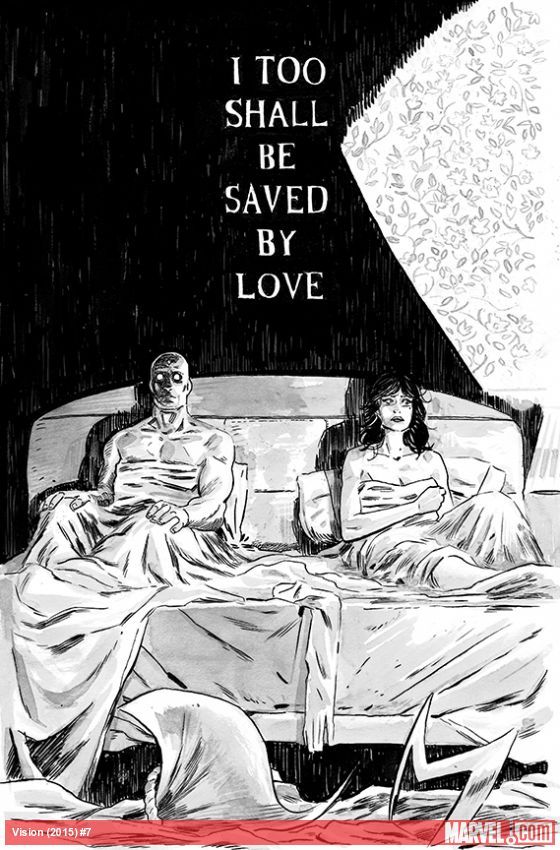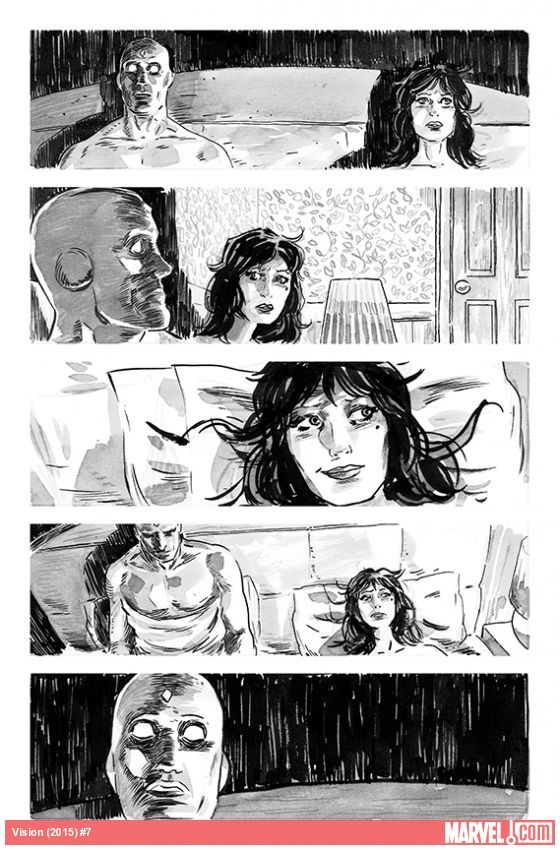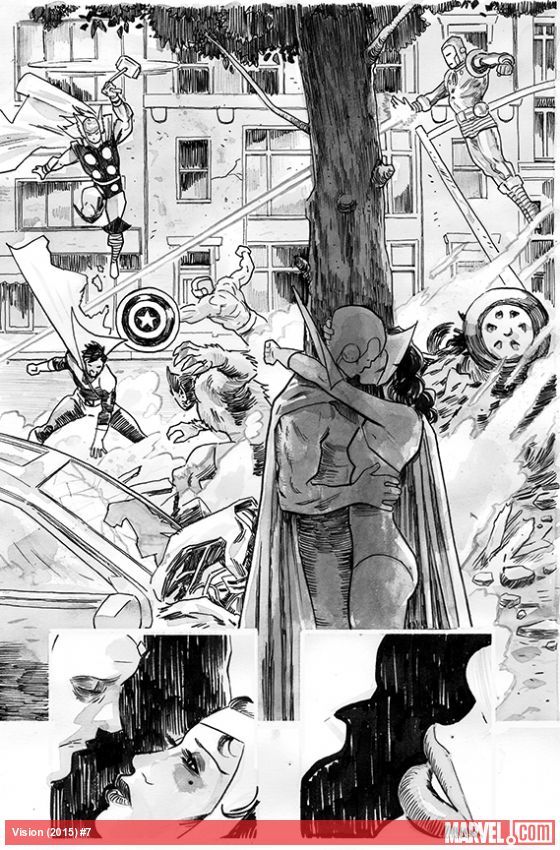Dating back to "The Adventures of Pinocchio" in the late 19th Century, the he struggle to become human has been a classic theme in tales of robots and other artificially created humanoids. One question these artificial intelligences don't usually ask is whether becoming more human actually makes them better. Taking on more of their makers' traits means embracing both humanity's nobility and its darker aspects. Marvel Comics' premier artificial being, the Synthezoid known as the Vision, is currently getting a crash course in this line of thought in the pages of his self-titled ongoing series by writer Tom King, artist Gabriel Hernandez Walta and colorist Jordie Bellaire.
The first arc of "Vision" chronicled the titular character's very human desire to lead a normal life, complete with a family and a house in the suburbs. He built exactly what he desired, but this unhinged collection of Synthezoids ultimately force the Vision to lie in order to cover up the murders his family committed. While he vowed to do whatever it takes to protect his wife, son and daughter from harm, his resolve will be tested as the book moves forward, especially now that his friends and comrades in the Avengers have learned just how the Vision's human desires have corrupted him.
CBR News spoke with writer Tom King about the fallout from the series' first arc and next month's "Vision" #7, a special issue drawn by Michael Walsh, that looks back at the relationship between the title character and the Scarlet Witch and celebrates their often contradictory continuity. King also discusses the series next arc beginning with Issue #8 and the secrets that will be revealed as he and Walta wrap up their long form story after twelve issues.
CBR News: Having read this first arc of "Vision," it feels like there's some interesting ideas being explored about artificial intelligence and humanity. Part of the reason Vision is walking down this path to corruption is his desire to be human and "normal." Is that a fair description?
Tom King: I think that's utterly fair. I don't have in my head a sort of one-to-one ratio of, "This is the theme. This is the metaphor, and this is how it's grafted onto our reality." I don't believe in doing that with the books. I want to tell the story for the story's sake, and hopefully all that stuff can boil underneath the seams. As I've written the book, though, that has come out as one the big themes.
It seems like in wanting to be human the Vision has opened himself up to both humanity's best and worst qualities.
Yeah, that's the Shakespearean part of it. The thing he wants the most is what's destroying him. That's the "Hamlet" aspect of this. Because the thing that "Hamlet" most prized is destroying him. So, yes, I love that part of him and I always go back to it. What is inching him forward toward what seems to be an ultimate defeat is the exact thing that he thinks is pushing him forward toward victory. That ironic tension is a large part of the book.
The final issue of the first arc introduced a new member of the Vision family, their new dog. Can you talk a little more about this character and the inspiration for giving the family a dog?
When you email back and forth with editorial you end up cracking all sorts of jokes, and one of the things we joked about was a dog. Which led me to think, "They definitely need a dog! How did I not have that in the first issue?"
So I knew a lot of things would be coming out in issue #6 and I had this idea about the dog. Then it all came together and made total sense in my mind. It was as if the whole story had been leading there.
I'm a child of divorce and I do remember getting a dog at the time of the divorce. It was like, "Okay, here! This fixes it. You have a dog now." [Laughs] I remember being seven years-old and thinking, "I'm not sure this fixes the whole situation, but I do like the dog." Everything you write is personal, but this comes from that personal space.
I love the dog, and we are having a contest to name the dog. So if you read "Vision" or if you don't read "Vision" and want to name the family dog either Tweet at me, write on my Facebook page, or write into Marvel with dog names. The dog's name will be reader chosen.
It looks like the brainwaves of their neighbor's dog Zeke were modeled for the Vision family dog.
Yes, that was horribly depressing, and not just because Zeke is the name of my wife's childhood dog. She is so mad at me! In kind of a funny way, but not in kind of a funny way, too.
Sometimes you write a script where you create a character and you just throw a name in there as a placeholder, and I write so many comic books that sometimes my placeholders just fall through. [Laughs] So it got published, and my wife was like, "Why is their dog named Zeke?" And I said, "I needed a dog's name and that was your childhood dog." So she turns the page and there he is on fire, and she goes "What are you doing to my dog?!" [Laughs] I was like, "I can explain!" Then I cut his poor little brain open.

That was the first page where Marvel said, "I think you guys have gone a little too far." The original was a little more aggressive in showing the brain stuff. Gabriel had to pull it back. So it was even worse in the first version.
[Laughs] Wow. When Zeke's owner, George, comes looking for his dog we see that the Vision family home has been trashed, and the kids don't exactly appear to be happy. I believe the trashing of the home is something you didn't show or talk about, correct?
Yeah, so when I write my scripts I have a sort of overall outline so I know where they start and where they end. Then I wrote the scene where the discovery was made and I was sitting there thinking about the aftermath of that and I realized everything about that scene was going to be a cliche. Any time I know I'm going to write something like that I try and stop myself because the audience already knows the cliche is going to happen. Because they already know it I thought I can just skip it!

So I skipped it and showed readers the aftermath of what happened. I feel like letting the conversation the audience had in their mind of what happened between Vision, Virginia, and the two children where the huge secrets among these robots come out fill things in was a much more powerful narrative tool than the conversation I would have written.
Can we assume that all the secrets between the family are out? Does Viv know the role her mom played in her lab partner C.K.'s death?
I wouldn't go that far. That actual piece of it is going to come out over the next few issues. That's a great question.
At the end of issue #6 you revealed Agatha Harkness has been telling the story of this first arc to a number of Marvel heroes. It feels like you've been laying some elaborate ground work and now going forward you're going to see this story expand into the greater Marvel Universe. Is that accurate?
Yeah, so this first half was a set up for this huge confrontation that's coming. What Vision does to help his family leads him into a confrontation with the heroes of the Marvel Universe. I wanted this story to start very small and personal, and then let those beats vibrate throughout the universe because I wanted the stakes to be super high for this comic book. I wanted the story to be important and cool.
So now that we've set this up and have sort of the personal drive we can get into the thrust of the story.
I think of the first issue as sort of a reflection of what the series is going to be as a whole; where you start off with this small personal story and it ends with this huge violence. The violence seems to matter more because you have that small, personal story. It's not just more noise.
So I think now that we set up that small story in our first half when the big punches come they won't feel like noise. You'll feel the knuckles on your face when the punches come.
You still have some more mysteries to reveal in these next few issues as well. Will readers find out the mystery of who Vision used to model Virginia's brain patterns soon, or is that something that won't come until the end?
That actually comes out in issue #7. So that mystery will be revealed next issue.
Issue #7 isn't exactly a stand-alone. It's more of a background issue. Before starting this new arc we're going to flash back to Vision's relationship with the Scarlet Witch. It will cover from when they first hooked up to when they "uncoupled."
So that entire issue takes place in the past. In it you'll find out the extremes Vision went to acquire the brain patterns for Virginia.
Wanda made her first appearance in your book at the end of "Vision" #6, but in a way her presence has been felt in the book since the very beginning. What was it like finally tackling the Vision and the Scarlet Witch's relationship in such a concrete and in-depth way?
Yeah, I said in the letters page that I feel Wanda's been just as big a character in the book as anyone. She's sort of like Luke [Skywalker] in the new "Star Wars" where her absence is almost as powerful as anything else. And as you mentioned, we see her on the final page of "Vision" #6 as she's hearing this story from Agatha. So she knows what the Vision has done and what he's going to do.
Now we're going to go back and look at the piece that hasn't been on the table. We're going to look at that closely and the impact that's had on the Vision's life. Because, to me, what Vision does and the decisions he makes are very informed by his relationship with Wanda.
It's a relationship with a continuity that goes back 50 years and it was a pleasure to go and read those stories; the [Steve] Englehart stuff, the Roy Thomas stuff, and the John Byrne stuff. The continuity of all those stories is insane. Clearly what was happening was these writers were fighting each other's ideas, and they sort of had to make up these things like Wanda doesn't remember, and Vision's mind was erased. All of that together make this a story that is more insane and more magical than any one person could do on their own. I think that makes great comics; all these writers contributing to this one continuity.
So I think all of that energy goes into who Vision is as a person.
Right. There's all these different contradictory stories. Like was he made from the Original Human Torch or was he not?
[Laughs] Yeah, there's like two pages in "Avengers Forever" where they explain it and I parsed that like it was the Zapruder Film because he's both of the Human Torch and not of the Human Torch. Basically the Human Torch got divided into two different alternate realities at the same time during the Vision's creation. So he's both the Human Torch and not the Human Torch.
I love that stuff! I think that's interesting because it's so complicated and doesn't make a ton of sense, and yet it leads to who he is. When I look back at my own life I feel like there are moments like that where it's so complicated and doesn't all make sense. It's not all linear.
If it was just one story written by one person it would be like, "Here's what this guy wanted. Does he achieve it or not?" But actual real life feels very crazy, unexpected and surprising. That tracks more with what a comic book universe is than a singular person's vision of what fiction is. I think that's what makes comics special.
"Vision" #8 is the start of a new arc titled "Little Better Than a Beast." The solicits bring to mind the second half of a crime or mystery movie where the police have discovered a murderer and they're trying to ensnare them. Is that a fair analogy for what's going on in this story?
I think what's important to see is that in issue #5 Vision is being questioned and they ask, "Who can confirm that what you said is true." And he's like, "I can confirm it." In his mind and a lot of people's minds, if Vision says something it's true.
So now Vision is saying things to people that are lies for the first time in a long time. He's saying everything is normal and fine and then a ghost of a witch comes to the Avengers and says, "Actually, he's lying to you." She's also accompanied by the Scarlet Witch who has gone crazy and almost destroyed the world a few times. They have much more checkered history than Vision does.
So the question is do the Avengers believe the ghost of the witch who tells them that their best friend has done all these bad things? Or their friend who's never lied to them? That leads them into a conflict of how to investigate this case and confront Vision with what he's done. That conflict will start to drive the rest of the story.
How much story time passes between the first and second arc? And will there be a P.O.V. shift with this story?
I don't want to say too much, but the ongoing narrative voice, our purple captions, will keep going. It's complicated now though because we revealed that it was Agatha Harkness telling the story of our first arc to the Avengers. That can't be though because now Agatha Harkness is part of the story. So who that voice is and what its purpose is won't be revealed until the final issue.
And there won't be a time gap between issues, but time does pass. We've been in the fall this whole time and now we're going to enter winter. By the end we'll come out in spring.
What's it like seeing Gabriel bring to life this next leg of the story where the Avengers are brought in? It seems like there would be a lot of fun opportunities for him.
[Laughs] Whenever I get a page back from Gabriel it's always better than what I thought it would be, and I thought it would be the best thing ever. So to me it's odd. I'm not excited to see him draw the Avengers or Captain America. I'm excited to see Gabriel draw a table.
In Issue #6 I did a full splash with no words and it was just going to be the Vision's face. That could be the most boring splash of all time, but I know Gabriel is going to turn it into a classic. Then I know once he turns it into a classic Jordie Bellaire, our colorist, is going to elevate it even beyond that and make it transcendent.
So it's not a case, "Oh yay! Gabriel gets to draw more stuff." It's that I can't get more excited. If I gave Gabriel a page of a dog walking down the street it's going to look like the most eerie dog walking down an incredibly eerie street. He draws the regular so well that I don't get excited about him drawing the irregular.
Right, I was marveling at the wreckage of the Vision home in Issue #6.
I know, and there's so much storytelling he does in terms of mapping to make sure that if you're anywhere in that room and you look to the left and the right it would all match up. Then he goes back to the objects we've been using over and over like the piano, the lighter, and the vase. He just kills it.
It's silly of me to have not known he was drawing on paper, but I saw someone bought a page of his and I was immediately like, "Gabriel give me a page! I need this on the wall!" So he's sending me art which is probably the best thing to happen to me all week.
It sounds like each of you are really giving this next arc a huge scope and scale. Will this arc bring the long form story you began in issue #1 to a close? Or are there still more arcs to go?
Nothing in comics is "done." That's why it's exciting. There will be places where the story can go after this. They're incredibly exciting places that I wish I could follow up on, but I'm going to bring the story that started on page one of "Vision" #1 to a close with issue #12.
So it will read as a sort of complete 12-issue maxi-series. And again there will be threads that other people can play with, but to me it will read like a novel. Sometimes you're sitting around and you want a read a comic book. Other times you want to read a graphic novel; just sit around on a beach and read an entire story. That's what this is.
It's funny because I'm doing that three times this year. I'm doing it with "Omega Men," "Sheriff of Babylon" and "Vision." So I'm sort of bringing in these three very different novels all in one year. I'm starting to think they're talking to each other and that it's kind of like a mini trilogy of some sort; like they have similar themes but are in different genres.
I wanted to close by giving some credit to my editor Wil Moss. I know it seems stupid to credit an editor. It's like when a Hollywood person thanks their agent at the Oscars. It's like, "I don't give a damn who their agent is." Wil Moss brought this team together though, and he drives this book. He's just a fantastic editor. I can't say that enough. He doesn't get enough credit for what he does on this book.
"Vision" #7 is scheduled for release May 11 from Marvel Comics.

